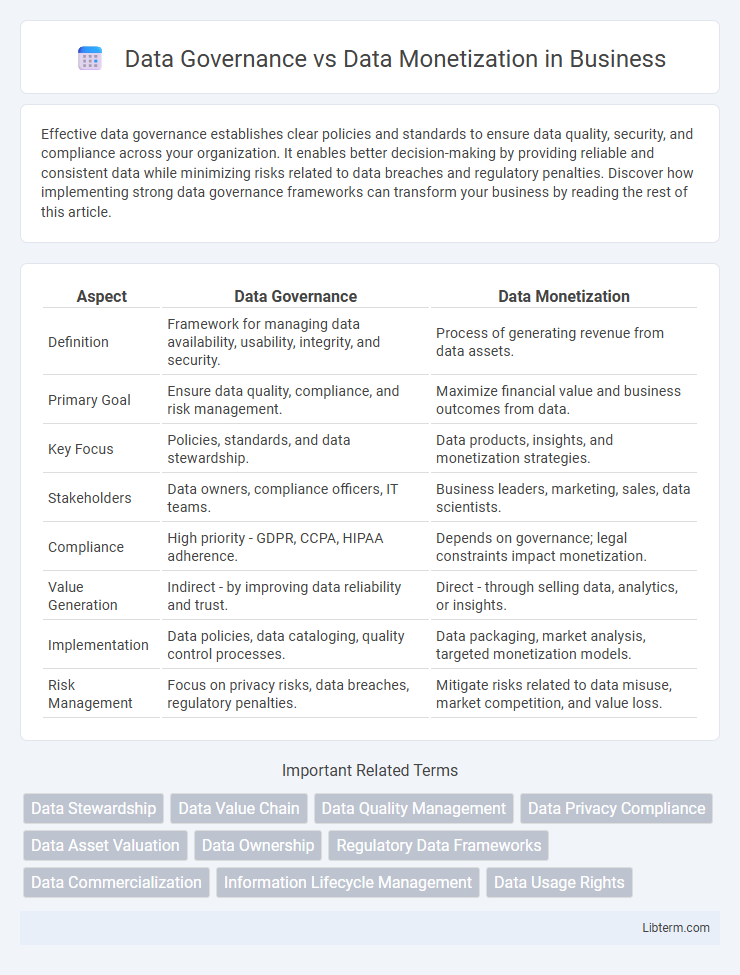Effective data governance establishes clear policies and standards to ensure data quality, security, and compliance across your organization. It enables better decision-making by providing reliable and consistent data while minimizing risks related to data breaches and regulatory penalties. Discover how implementing strong data governance frameworks can transform your business by reading the rest of this article.
Table of Comparison
| Aspect | Data Governance | Data Monetization |
|---|---|---|
| Definition | Framework for managing data availability, usability, integrity, and security. | Process of generating revenue from data assets. |
| Primary Goal | Ensure data quality, compliance, and risk management. | Maximize financial value and business outcomes from data. |
| Key Focus | Policies, standards, and data stewardship. | Data products, insights, and monetization strategies. |
| Stakeholders | Data owners, compliance officers, IT teams. | Business leaders, marketing, sales, data scientists. |
| Compliance | High priority - GDPR, CCPA, HIPAA adherence. | Depends on governance; legal constraints impact monetization. |
| Value Generation | Indirect - by improving data reliability and trust. | Direct - through selling data, analytics, or insights. |
| Implementation | Data policies, data cataloging, quality control processes. | Data packaging, market analysis, targeted monetization models. |
| Risk Management | Focus on privacy risks, data breaches, regulatory penalties. | Mitigate risks related to data misuse, market competition, and value loss. |
Understanding Data Governance
Data governance establishes the framework of policies, procedures, and standards to ensure data quality, security, and compliance across an organization. It focuses on data stewardship, data ownership, and regulatory adherence, creating a trustworthy environment for reliable data management. Effective data governance is essential for mitigating risks, enhancing data accuracy, and enabling data monetization strategies by providing high-quality, compliant data assets.
Defining Data Monetization
Data monetization refers to the process of leveraging data assets to generate measurable economic benefits, such as revenue growth, cost savings, or improved operational efficiency. It involves transforming raw data into valuable insights, products, or services that can be sold or used to enhance business strategies. This contrasts with data governance, which focuses on managing data integrity, security, and compliance to ensure data quality and regulatory adherence.
Key Objectives: Governance vs Monetization
Data Governance focuses on establishing policies and standards to ensure data quality, security, compliance, and accessibility across the organization. Key objectives include maintaining data integrity, protecting sensitive information, and enabling reliable decision-making through consistent data management. In contrast, Data Monetization aims to generate revenue by leveraging data assets, extracting actionable insights, and creating new business opportunities through data-driven products or services.
Core Principles and Frameworks
Data Governance establishes the core principles of data quality, privacy, compliance, and accountability, ensuring accurate and secure data management through frameworks such as DAMA-DMBOK and COBIT. Data Monetization prioritizes extracting measurable business value from data assets by leveraging frameworks like the Data Monetization Canvas, emphasizing data accessibility, usability, and strategic alignment. Both disciplines require robust metadata management, clear data ownership definitions, and scalable data architecture to maximize data utility within regulatory and commercial frameworks.
Data Quality and Compliance Considerations
Data governance ensures high data quality through standardized policies, rigorous validation, and consistent monitoring, which are critical for regulatory compliance and minimizing data risks. Data monetization leverages this well-governed, compliant data to unlock business value by enabling accurate analytics, targeted marketing, and new revenue streams without compromising privacy or legal requirements. Organizations that integrate robust data governance frameworks with monetization strategies maintain trust, meet data protection laws like GDPR, and sustain competitive advantage through reliable, compliant data assets.
Value Creation from Data Assets
Data governance establishes the framework for ensuring data quality, compliance, and security, which maximizes the reliability and usability of data assets. Data monetization transforms these governed data assets into actionable insights, new revenue streams, and competitive advantages, driving tangible business value. Effective value creation depends on integrating robust governance with strategic monetization to unlock the full potential of data as a critical enterprise asset.
Risks and Challenges in Data Management
Data Governance faces risks such as data privacy breaches, regulatory non-compliance, and inconsistent data quality that can undermine organizational trust and decision-making. Data Monetization introduces challenges including data security threats, intellectual property concerns, and ethical issues related to data usage and sharing. Effective data management requires balancing governance protocols with monetization strategies to mitigate risks while maximizing data value.
Integrating Data Governance with Monetization Strategies
Integrating data governance with monetization strategies ensures that data quality, security, and compliance frameworks support the effective commercialization of data assets. Robust data governance provides a structured approach to managing data integrity and privacy, enabling organizations to confidently leverage data for revenue generation and innovative product development. Aligning governance policies with monetization objectives maximizes data value while mitigating risks associated with regulatory violations and data misuse.
Best Practices for Balancing Control and Revenue
Effective data governance establishes clear policies, robust security measures, and compliance frameworks that protect data integrity and privacy while enabling strategic data sharing. Data monetization practices leverage governed data to create revenue streams by identifying valuable data assets and applying analytics to generate insights without compromising control. Organizations that integrate continuous monitoring and stakeholder collaboration achieve an optimal balance between data control and maximizing revenue opportunities.
Future Trends in Data Governance and Monetization
Future trends in data governance emphasize enhanced automation through AI-driven compliance tools and dynamic policy management, ensuring real-time data quality and privacy adherence. Data monetization is evolving with decentralized data marketplaces and advanced analytics platforms that enable organizations to derive actionable insights and generate revenue from data assets securely. Integration of blockchain technology is expected to bolster trust and transparency in both governance frameworks and monetization processes, facilitating regulatory compliance and expanding monetizable data ecosystems.
Data Governance Infographic

 libterm.com
libterm.com